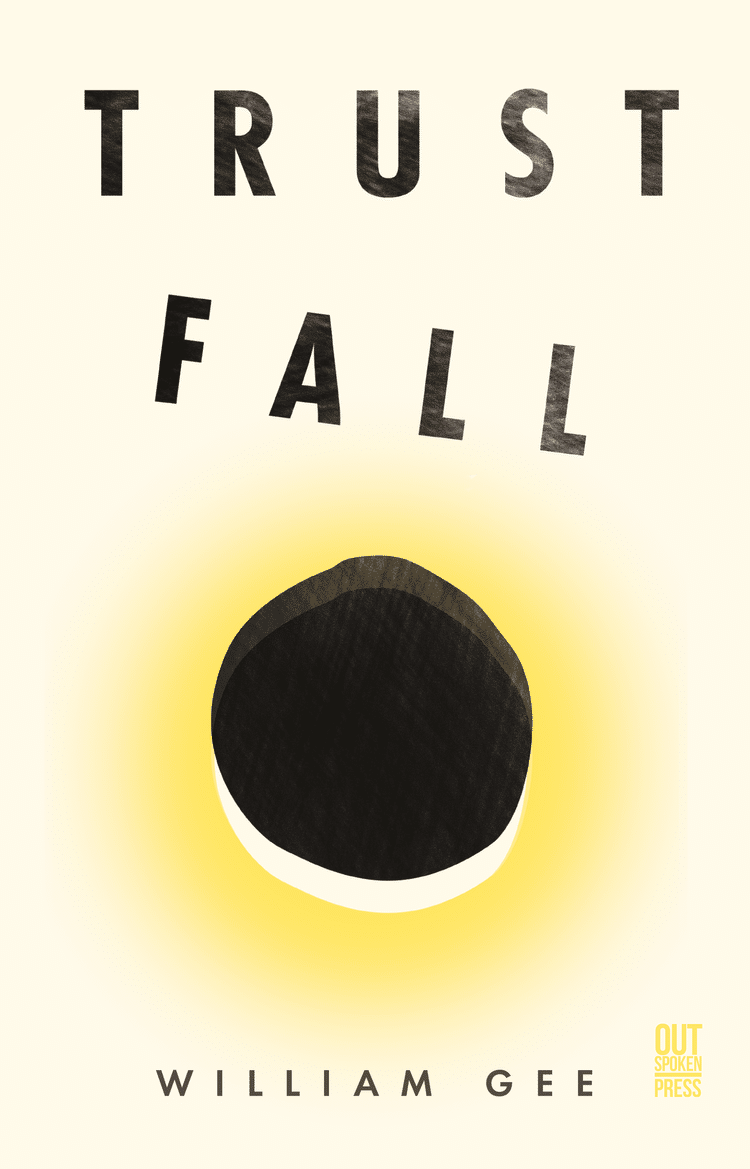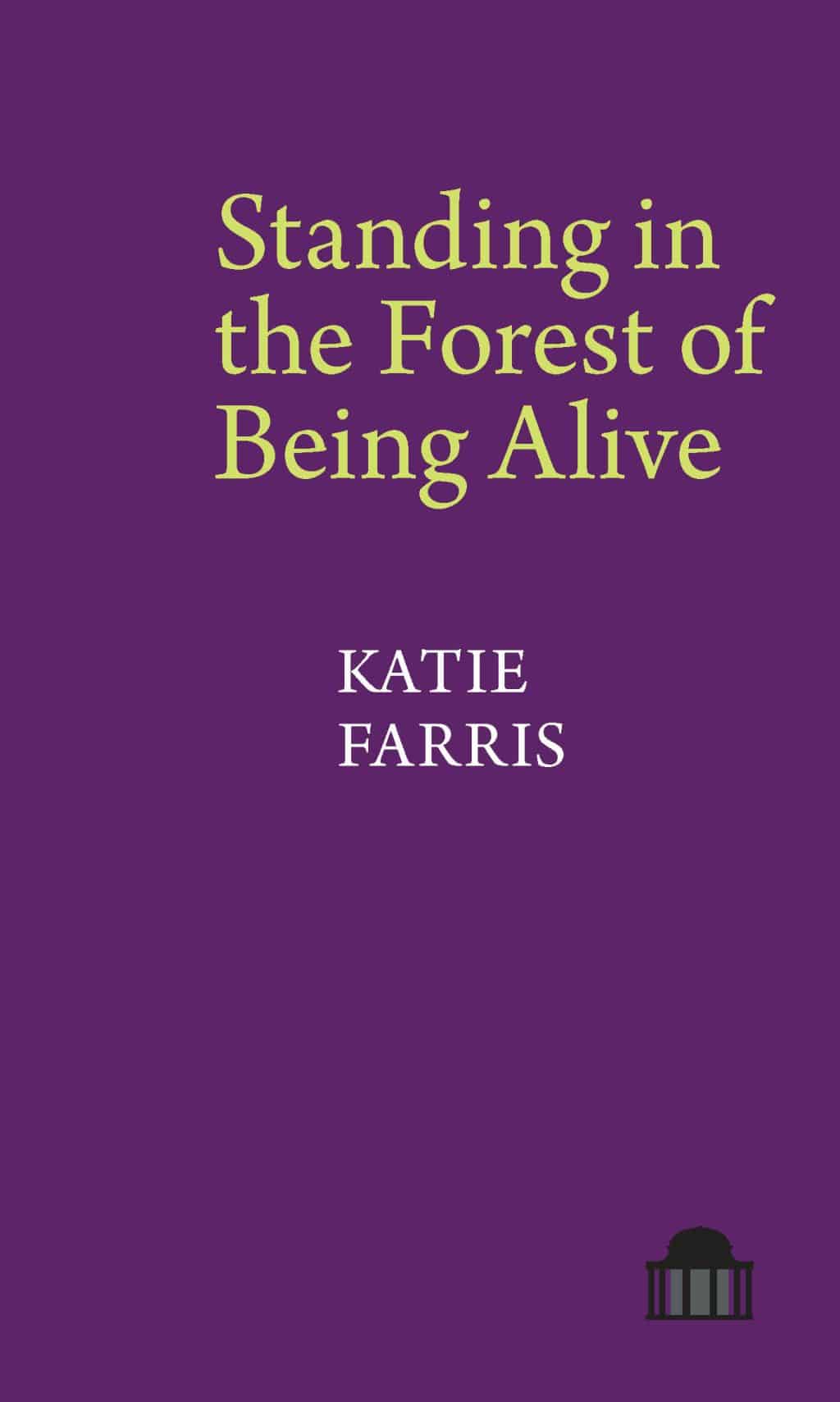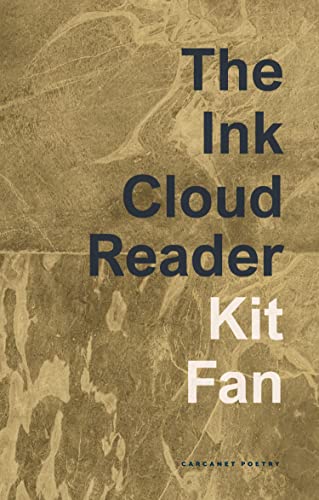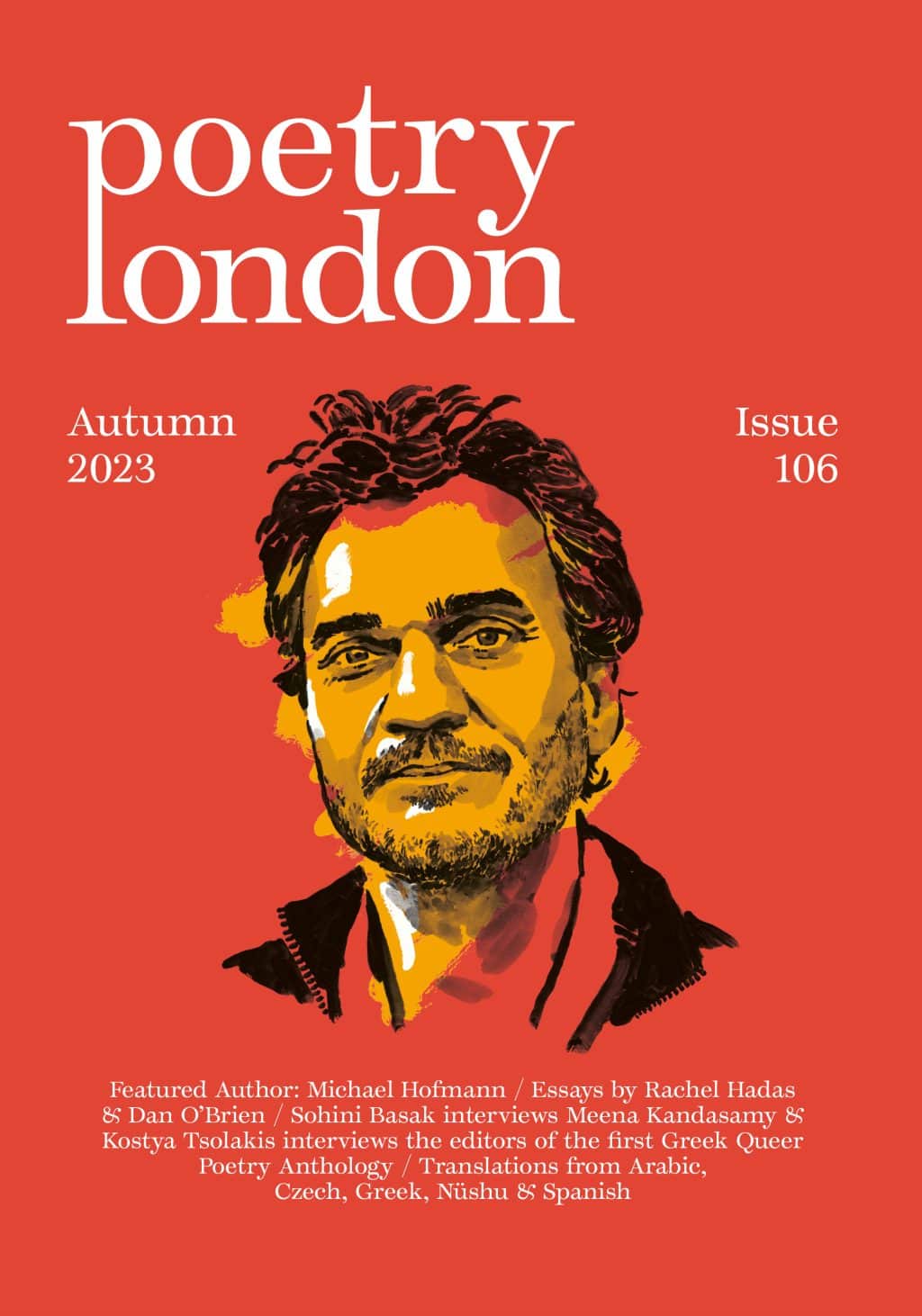The Body in Bold
Aliyah Begum on three visceral books that consider the body within the context of illness, identity, and desire
Aliyah Begum
-

Trust Fall
William Gee
Out-Spoken • £8.00 -

Standing in the Forest of Being Alive
Katie Farris
Pavilion Poetry • £8.80 -

The Ink Cloud Reader
Kit Fan
Carcanet • £12.99
The body is a tender space, a negotiation between the soft and the sore. William Gee’s pamphlet Trust Fall navigates this experience of the body through the perspective of chronic illness, and there is an aching sense of guilt throughout – of occupying time, space, and ultimately of being loved. The poems heave with a longing to let go, as Gee’s speaker attempts to disentangle his self from his body. In ‘sickness eats up every space for you’, the speaker talks about himself in the third person, describing how ‘a young man faints in our bathroom / head narrowly missing the cabinet thank god’. This displacement of the self continues until ‘in the morning you poach eggs for his body / spinach to bring up his iron and I sit / inside of him like a church’. It is a haunting image, the ‘I’ taking up as much space in his body as an onlooker in a pew – the body is cavernous in its overwhelm of the self.
Throughout the pamphlet, Gee provides stark replications of the pain of chronic illness:
I wake up and confuse it with dying each day as it comes but with less of what sweetens I punch my chest purple drawing pain from everywhere else […] (‘being here is less and less ok’)
However, there is also a pulsating anxiety regarding the space that the body occupies. In ‘fog (one)’, the speaker describes himself ‘lying in / a sweat stain the shape of my body’, and in ‘what’s wrong with me’, he confesses that ‘nothing I can do will stop the depression / of my heavy frame into our sofa’. In ‘until necessary open arms’, this anxiety moves beyond the domestic to the public sphere:
my fibromyalgia taking up space in the waiting room spilling over the seat of a balding pleather armchair […] reduced workforce, my sympathetic bosses, dull your trust hard against me. I am never going to work again the way you want me to. even with my best nodding, this underlying self. This always ill.
This focus on the body’s interactions with its surroundings articulates the hostility and ableism of capitalism, and the guilt that such burdens induce. In ‘the apples’, the speaker commiserates with his partner, stating, ‘it’s your job to not feel taken from / when often & completely I don’t work’, and the poem’s final line leaves the reader with ‘the way my muscles can’t make us dinner’. However, the failure embedded in these lines belongs not to the body, but to the world surrounding it. The body is also considered tender in the monetary sense, as it must be traded, productive, of use, and Gee depicts the guilt that capitalism and masculinity impose on those who cannot fulfil this reductive definition of the body. In ‘11”11’, the speaker describes ‘all the good selves I’ve had’ as ‘running for country’, ‘brewing steady dopamine’, and ‘carrying the shopping / home from the big sainsbury’s unhurt’. Through these verbs of movement and exertion, the speaker invokes the expectation that is placed upon masculinity to provide from which the equating of value is drawn.
The collection is mostly devoid of punctuation (with a few exceptions) and instead it is expressions of love – sincere in their simplicity – that function as pauses, exhalations of breath:
fixing my slow unchanging agony to your far away breathing your need to leave the house you’re perfect in your dress have a safe journey (‘what’s wrong with me’)
As well as these moments of respite, the spacing of text on the page in many poems in the pamphlet is often unpredictable, replicating the instability of chronic illness and the body.
By the end of the pamphlet, the recurring sense of guilt and disconnect between the self and the body begins to unravel. The final poem, ‘soho square’, begins: ‘here comes something different & possible’. The speaker still views their body as a burden (‘the ways I have to live my life have / stretched like police tape round yours & my useless stomach is demanding to be emptied’) but now there is the added perspective of the body – and the self – deserving to be loved: ‘I know you’ll come with me / you’ll wait on your phone outside the m&s bathrooms / & you’ll love me’.
Katie Farris’s latest collection Standing in the Forest of Being Alive also contemplates the body as a space for loss and love. Woven around the chronology of Farris’s cancer treatments and written by the American poet during the pandemic, it is a masterful exploration of the body at both an intimate and national scale, as Farris considers crises of the body in singular and collective forms. The first poem of the collection – ‘Why Write Love Poetry in a Burning World’ – describes the environment from which Farris is writing. We are ‘in the midst of hell’, politically, socially, and ecologically, and at the same time, a cancer diagnosis is its own ‘burning world’ for an individual. Farris deftly draws together these dual states of crisis, most clearly in the poem ‘Five Days before the Mastectomy, Insurrection at the Capitol’. Here, the personal and the political collide, and what lies at the intersection is the body:
Who holds you holstered America the gun? What is the door the bullet makes in the body? What do we call it? Body?
These questions have many implications – if the body is a wound, and a wound is a door, then there is a porousness between the self and the world. This motif of the door occurs throughout the collection. In ‘Why Write Love Poetry in a Burning World’, the bodily experience of cancer is described as ‘a door / I cannot close I stand / within its wedge / a shield’; in ‘After the Mastectomy’ the speaker asks, ‘Why bother closing a door / when everyone demands it open?’; and in ‘Woman with Amputated Breast at her Mother-in-Law’s Grave’, ‘a grave is / a door / we open’. These doors are always opened, and a proximity between the body and the world is held closely, where the world is nature, conversations, other bodies – everything we can and cannot touch outside ourselves.
Amidst the events of 2020-21, with the pandemic, wildfires, January 6 Capitol riots, and the Black Lives Matter movement, Farris writes at a moment when distance is paramount. But by keeping the door between the body and the world open, the collection seeks to facilitate their convergence. This can be seen in ‘The Invention of America’ as the speaker considers the location of the body within the state. The poem features a defiantly oppressive repetition of ‘America’ cascading at the start of nearly every line of the first stanza:
I am trying to be a love poet though I cannot escape America it’s as if I am married to America and no one stood to object America […]
This replicates the loudness, the omnipresence of America as an idea, mimicking the click-flash of cameras, headlines, and advertisements. The poem goes on to question the construction of this idea:
As an anti-capitalist act, I reject your hierarchies of worth, America – All things are erotic. O cockroach, smooth as a lozenge, glossy as hard candy, antennae clever as spun sugar, come into my mouth.
The divisive ‘hierarchies of worth’ are disavowed in favour of a communion of the body, and the erotic supersedes the political. Farris addresses ‘The Invention of America’ to the body as an individual, as well as the body of people that, in every sense, make up America.
This sense of convergence is also explored at the level of the intimate. In the poem ‘If Marriage’, Farris considers a definition of marriage as ‘a series / of increasing / intimacies, a slow / sweet collapse into / oneness’. The poem, with short lines that seem to tip-toe down the page, then devastates:
I would still beg your forgiveness for asking your assistance unwinding that pale hair from my hemorrhoid.
Standing in the Forest of Being Alive is a collection of loss that finds solace in proximity and drawing closer – not only within the individual body, but between bodies, and with the earth itself. The collection’s eponymous poem ends with the idea that ‘what’s nameless inside our veins / fluoresces, fluoresces in the rain’, and in its final poem ‘What Would Root’ we learn that ‘everything was everything’. Farris, in this incisively gorgeous collection, provides an antidote to overwhelm and division – let go, and find yourself everywhere you weren’t.
Kit Fan’s collection The Ink Cloud Reader is also a marvel of language and form. It looks towards the past and the future, excavating both memory and a crystallised loss that is not yet realised. This multifaceted gaze is reflected in the collection’s structure: its three sections, ‘Once Upon A Cloud’, ‘Hong Kong, China’, and ‘Broken Nosed Jizō’ move between the self, the city and family, and the broader world in crisis respectively. One of the first poems of the collection opens with an act of defiance – a quote from Elmore Leonard condemning ‘suddenly’ as ‘the most overused, least-needed word in fiction’ nestles between the title and the first word of the poem: ‘Suddenly’. The rest of the poem is a lyrical retelling of Fan’s life told in ‘suddenlys’ that also maps the themes of the rest of the collection (loss, desire, the body).
The use of form in this collection is magnificent – each poem varies with imaginative and visual delight. From the em-dashed trail of thread that weaves through ‘A Story of a Labyrinth’, to the font fading in ‘Mnemosyne’ (named after the Greek goddess of memory), Fan’s formal ingenuity is striking, and never gratuitous. A compelling example of this is ‘In the Photocopying Room’, whose rhyming couplets and double-page spread, comprising ‘Side 1’ and ‘Side 2’, replicate the corporeality of desire between two bodies through the act of reproducing texts: ‘I broke spines. Prose that spoke to me I fingered tenderly. / The hyper-theorised I shoved them facedown scholarly // onto a plain of glass placider than the brain.’ On the facing page, ‘Side 2’, someone else enters the room, bringing with them a charged atmosphere that ends the poem with ‘jamming the machine as our breath rhymed, unrhymed’. It is an allusive poem, intimate with both literature and the body.
This is also the case for the poem ‘Glück’, which takes the form of a playscript whose characters include ‘Sun, Shade, Yew, Sick Man, Another Man, Book’. Set outside the Urology Department of Malton Community Hospital, the poem speaks to the news of an illness that skirts around the rest of the collection and is left unnamed. While Gee and Farris explore illness in their collections from the body itself, Fan takes an indirect approach, replacing the body and its blood with the literary corpus of ink. In ‘Glück’, for example, the only speaking roles are given to the Sun and Shade:
SUN: If you don’t take him, I will.
SHADE: (tongueless and murmuring) He’s reading Louise Glück.
SUN: So?
SHADE: Didn’t you hear? She said the poem is a revenge on loss. And I’m nothing but loss. (The sun too hesitates while spilling over the parking lot.)
[…]
SUN: (clearing its throat) I am not afraid of glück. (And opens its wide blue mouth.)
In using Glück’s conception of ‘the poem [a]s a revenge on loss’, the poem casts a self-referential gaze at the unspoken loss and unnamed illness at its core. However, the poem, once again, defies the very rule it introduces – the Sun furthers the loss that is the object of the poem’s revenge. This exchange between the Shade and the Sun exemplifies the contrasting patterns of loss and reproduction that characterise Fan’s collection – of oblivion and memory, the waxing and waning of the moon, and of ink and paper. The Ink Cloud Reader bleeds brilliance through every page.
Aliyah Begum is a poet who has performed her work at COP26, the RSC, and Verve Poetry Festival. She was chosen as a Young Critic for the T S Eliot Prize 2022 by the Poetry Society and was Birmingham’s Young Poet Laureate between 2018-2020. She is currently studying English at Oxford.


